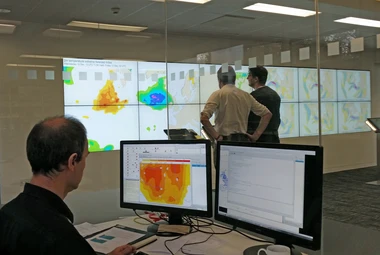Subdivision on Hydrological forecasting
Chair: Louise Slater

The Hydrological Forecasting subdivision covers all topics focusing on the estimation of future hydrological states.
Efficient hydrological forecasting is required by a growing number of sectors to manage floods, droughts and other water-related risks. Hydro-meteorological forecasting systems provide predictions, future scenarios, and estimates of uncertainty as input to the decision-making processes of their users. They are increasingly being developed to answer the needs of economic sectors sensitive to weather and climate variability (e.g., water supply, hydropower, agriculture, tourism, navigation).
Hydrological forecasting has many challenges today: producing accurate and reliable forecasts operationally for water and risk management applications, accessing real-time data and assimilating these data in the forecasting process, developing reliable tools for evaluating risk and probabilities of extreme events, integrating economic models for informed decision-making, making best use of human expertise in ensemble-based and probabilistic forecasting systems, documenting societal responses and impacts of extreme events, as well as implementing user-friendly visualisation products and dialogs to support real-time procedures.
Topics covered:
Scientific sessions under the umbrella of the Hydrological Forecasting Sub-Division aim to promote knowledge on current advances and approaches leveraging state-of-the-art techniques and datasets to develop better methods, products, and services for users of hydro-meteorological forecasting systems (e.g., public water agencies, hydropower companies, flood forecasting centres, agricultural enterprises).
Topics of interest include:
- coupled meteorological-hydrological forecasting models for gauged and ungauged catchments,
- flash flood forecasting and associated hydro-geomorphic processes,
- predictive uncertainty estimation,
- data assimilation and pre-/post-processing in real-time,
- hydrological ensemble prediction,
- monitoring and forecasting drought and water scarcity,
- sub-seasonal to seasonal forecasting,
- model and forecast evaluation,
- outlooks and communication of alerts and forecasts,
- decision-making and response in hydrological forecasting systems,
- (hybrid) forecasting approaches employing AI & ML,
- operational forecasting and warning,
- contributions to the decision-making process,
- impact-based forecasting and forecast-based action,
- digital approaches to public engagement, including digital twins, AR, and VR,
- citizen science and use of local knowledge,
- co-development and design of tools and applications with stakeholders,
- novel data analytics, communication, and visualisation approaches, and
- innovation to water resources management through weather, climate and water services.
Hydrological Forecasting targets different time scales (short-term, medium-term, and long-term) and different spatial scales (from local to regional and global scales).
